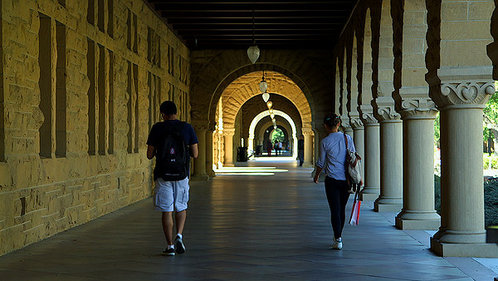Ivory Tower traverses a lot of territory in its 90-minute runtime. We explore the efficacy of free online classes, compare the rise in tuition across years, decipher potential reasons for tuition costs, view the way student body compositions shifted in public institutions, and even attend a student protest at Cooper Union. If you were wondering how the film can look at so many topics in such a short time effectively, you’d be surprised by Rossi’s efficiency. Still, they don’t address much of the territory that could be covered by each question.
As a Northeastern University student, some of Rossi’s frustration will be shared. One sequence near the beginning of the film covers the perks war amongst colleges trying to compete for top students. Why do universities have massive fitness centers, rock climbing walls, unnecessarily extravagant buildings and so on? At Northeastern many of us wonder, how necessary was the recent renovation of the Curry Student Center or how important is the prevalence of random plasma screens everywhere? Are we paying unbelievably high sums to pay for all these overabundant perks? As a result of these behaviors and others, student tuition has risen more than any other good or service in the US economy since 1978 (by a large margin). The documentary lays out this information and asks, are you buying a higher quality education or perks?
Beyond the extravagance of facilities is the issue of diluting the quality of students. As the cost of public universities, supposedly aimed at affordability, shifted from the state to the student, out-of-state enrollment at public universities doubled. Out-of-state students pay more for tuition to public universities than in-state students; thus, many public universities ease the admittance standards for these students to increase the school’s income. Some administrators in the film cite these students as those who skate by partying and meeting the minimum academic requirements. It’s easy to dismiss this as a generalization, but the reality is that students aren’t graduating. 68% of students at public universities fail to graduate in four years.
I could go on with many other well-substantiated dissections of the current problems we face regarding academic institutions. The film does these very well. Where it falters however, is in its conclusions. One major event in the film is the recent protests at Cooper Union, an elite school in NYC with less than 1,000 students. What’s most remarkable about Cooper Union is that due to a large endowment from its founder, 100% of students attend the school on full scholarship. Protests emerge when the school proposes charging tuition for the first time in its history. The reality is that the school is in debt that it needs to break out of. Rossi astutely points out that while the school does run at a deficit, a big part of its massive debt is due to a loan for an overly luxurious new building. Where he loses me is by also pointing a finger at the college’s president for taking a large salary and making poor investments. While the president’s salary does seem outrageous for a free college, it accounts for mere pennies of the overall debt. On the topic of investments, I find it absurd to angrily point a finger at someone for investing the school’s endowment and losing much of that money because of the financial crisis. Investing the money in the first place was a smart attempt to feed the cost of the institution and very few had an inkling of the forthcoming market crash. The film then goes on to glorify and overdramatize a protest held by students in which they occupied the Cooper Union president’s office for 65 days. It seems that Rossi wants us to do the same. Personally, I imagine a very different solution. Why not an emergence of new institutions, or remodeled current institutions, which strip away the perks and offer significantly more affordable tuition rates? What about continuing to foster the emergence of effective online education?
I’m not saying that filmmakers must draw the same conclusions as I do, but that in this case, Rossi’s solutions strike me as old-fashioned and as unsuccessfully backwards as the institutions he’s criticizing. Ivory Tower is riveting and informative. I definitely recommend seeing this film as its issue impact everyone in the United States; just don’t check your skepticism at the door.
Grade: B+


 RSS Feed
RSS Feed
